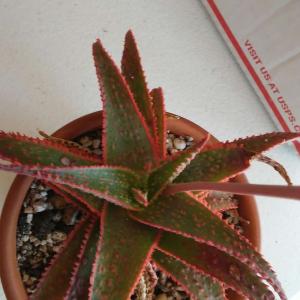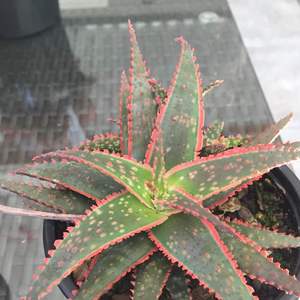Plant Experience
Detail
Aloe 'Christmas Carol' is a small, slow-growing succulent, up to 1 foot (30 cm) tall and wide, with up to 6 inches (15 cm) long, deep green, lance-shaped leaves that have raised, vibrant, dark red markings, some soft but spine-like, down the center and along the leaf margin. The flowers are reddish-pink.
How to Grow and Care
Aloe is a very forgiving plant, and a well-grown plant can be quite beautiful. As with all succulents, it is essential that Aloe is never allowed to sit in stagnant water, and the plant should be carefully monitored to watch for signs of overwatering.
These succulents are not particularly fast-growing and will only rarely need repotting. Repot Aloes in the spring that are tipping over their pots or have ceased growing. Use a fast-draining potting mix with one-third sand or pebbles. During repotting of a larger plant, it is possible to carefully divide the root ball. Some varieties of Aloe will send off offsets that can be potted independently.
Aloe plants need strong, bright light. They can withstand full summer sun, once acclimated. In the winter, provide bright light. It prefers warmer temperatures of 70 to 80 °F (21 to 27 °C), but will survive down to 40 °F (4.5 °C). Feed with a succulent fertilizer in the summer only. Suspend feeding in the winter as the plant goes dormant.
Growing Conditions
Light: Strong, bright light. They can withstand full summer sun, once acclimated. In the winter, provide bright light.
Water: Water generously in the summer and nearly cease watering in the winter. Do not let water stand in the rosettes.
Temperature: Prefers warmer temperatures of 70 to 80 °F (21 to 27 °C), but will survive down to 40 °F (4.5 °C).
Soil: A well-drained potting mix is essential. Use a cacti or succulent mix.
Fertilizer: Feed with a fertilizer for cacti and other succulents in spring and summer only.
Repotting
Aloes are not particularly fast-growing and will only rarely need repotting. Repot plants in the spring that are tipping over their pots or have ceased growing.
Propagation
During repotting of a larger plant, it is possible to carefully divide the root ball. Some Aloes will send off offsets that can be potted independently.
How to Grow and Care
Aloe is a very forgiving plant, and a well-grown plant can be quite beautiful. As with all succulents, it is essential that Aloe is never allowed to sit in stagnant water, and the plant should be carefully monitored to watch for signs of overwatering.
These succulents are not particularly fast-growing and will only rarely need repotting. Repot Aloes in the spring that are tipping over their pots or have ceased growing. Use a fast-draining potting mix with one-third sand or pebbles. During repotting of a larger plant, it is possible to carefully divide the root ball. Some varieties of Aloe will send off offsets that can be potted independently.
Aloe plants need strong, bright light. They can withstand full summer sun, once acclimated. In the winter, provide bright light. It prefers warmer temperatures of 70 to 80 °F (21 to 27 °C), but will survive down to 40 °F (4.5 °C). Feed with a succulent fertilizer in the summer only. Suspend feeding in the winter as the plant goes dormant.
Growing Conditions
Light: Strong, bright light. They can withstand full summer sun, once acclimated. In the winter, provide bright light.
Water: Water generously in the summer and nearly cease watering in the winter. Do not let water stand in the rosettes.
Temperature: Prefers warmer temperatures of 70 to 80 °F (21 to 27 °C), but will survive down to 40 °F (4.5 °C).
Soil: A well-drained potting mix is essential. Use a cacti or succulent mix.
Fertilizer: Feed with a fertilizer for cacti and other succulents in spring and summer only.
Repotting
Aloes are not particularly fast-growing and will only rarely need repotting. Repot plants in the spring that are tipping over their pots or have ceased growing.
Propagation
During repotting of a larger plant, it is possible to carefully divide the root ball. Some Aloes will send off offsets that can be potted independently.
Album (4)




Related Users
Elite Article
















